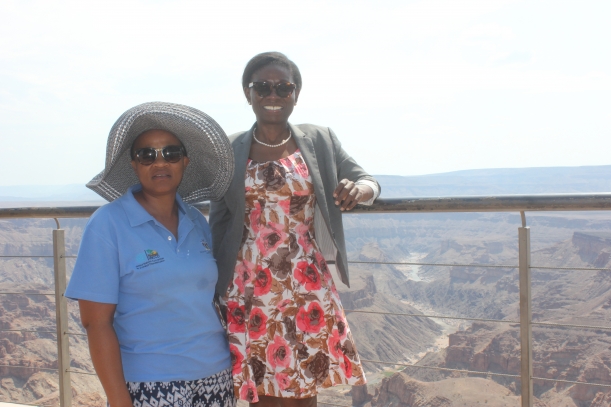UNDP Resident Representative visits the Klein Karas Community in the Greater Fish River Canyon Landscape, for the first time

UNDP Visits Klein Karas Community in the Greater Fish River Canyon Landscape
The United Nations Development Programme (UNDP), Namibia’s delegation headed by the country’s Resident Representative, Ms. Kiki Gbeho undertook a field visit to the Klein Karas community of the Greater Fish River Canyon Landscape during 3-5March 2016. The visit was part of the UNDP’s monitoring and evaluation on NAMPLACE project’s implementation.
The Klein Karas community, west of Grunau is a small community with the population of about hundredpeople in the Greater Fish River Canyon Landscape. The landscape is one of the five pilot sites for the NAMPLACE project aimed at lifting barriers to the establishment of large-scale network of Protected Landscapes.
The NAMPLACE project supported the sewing project and the tourism information center of the Klein Karas community. However, following the former minister of Environment and Tourism, Honorable Netumbo Ndaitwah’s visit to Klein Karas in 2012, she gave a directive to the NAMPLACE project to further identify and support income generating projects for the Klein Karas community, aimed at empowering the community and enhance their livelihoods. During that ministerial visit to Klein Karas, Minister Ndaitwah handed over the sewing project and the tourism information center for the community.
Following the minister’s directive, NAMPLACE Project provided infrastructural, implements and capacity building support to the Klein Karas Community garden. Additionally, more implements and capacity building support was rendered for the sewing project. The two project are aimed at providing employment, food security, and self –reliance to the community, for poverty alleviation.
As part of the visit, a de-briefing meeting was arranged between the visiting team and the Klein Karas community, followed by a tour of the sewing project and the garden. The meeting was attended by various stakeholders including the Klein Karas community, United Nations Development Programme (UNDP), Environmental Investment Fund (EIF), Global Environment Facility (GEF) focal person, Gondwana Collection representatives, Traditional Authority and NAMPLACE Project. The main purpose of the visit was to familiarize the UNDP team on the NAMPLACE interventions in the Greater Fish River Canyon Landscape (GFRCL) and progress thereof, as well as addressing challenges faced.
The UN RR, expressed delight in the concept of the NAMPLACE project, specifically the fact that the project is addressing a high level objective of increasing the range land for the wildlife, yet also incorporating the finer elemen of taking care of the landscape members’ every day livelihoods. This, as she described it, is in line with the national agenda and focus on poverty alleviation, and it is also crucial for sustainability after the project closure.
Another interest shown by the visiting team in the Klein Karas socio-economic projects is the partnership arrangement between various institutions in supporting the community, such as that of NAMPLACE, EIF and the Gondwana Collection group on the community garden project. While the community reported on challenges faced by their respective project’s operations, there is a general agreement and willingness to continue to strive for better, with support from the partners involved, as well as to explore new avenues. At the event, the EIF extended the invitation to Klein Karas Community garden to be taken to another community garden in Olushandja, in the northern of Namibia, for more exposure and opportunity to learn more about community gardening.
Ms. Mungunda, a member of the Klein Karas expressed appreciation of the visit, highlighting that it is through visits such as this, that that the community challenges are better understood by supporting partners and an appropriate solution is sought. The visit was concluded with a stop at the iconic Fish River Canyon where some work done by previous GEF project, SPAN was noted and acknowledged by the UNDP representative.
-----The end-----



